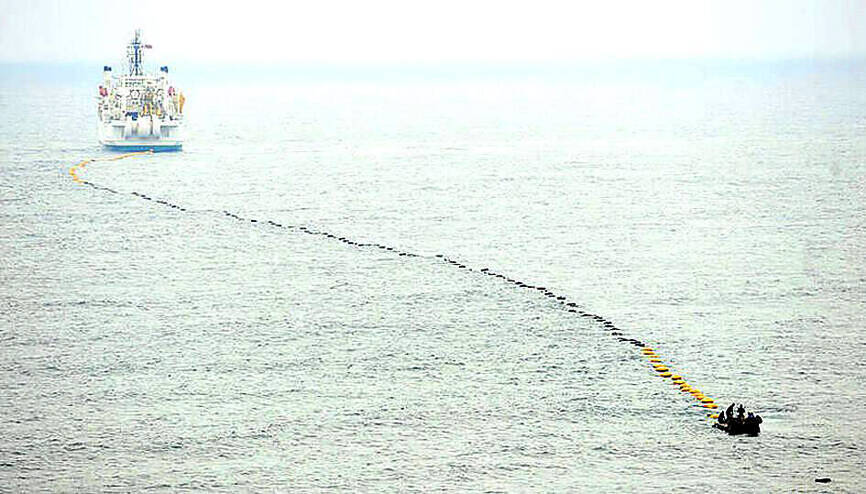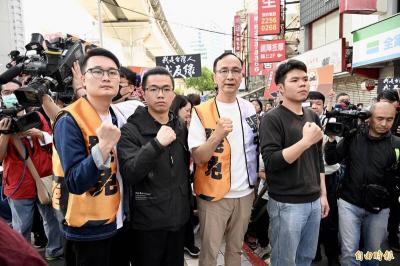Taiwan needs to streamline the application process for new undersea cables to “encourage more investment,” while also prioritizing the protection of critical underwater infrastructure against China’s “gray zone” threats, the head of the Taiwan Network Information Center (TWNIC) said yesterday.
In a speech at the TWNIC Engagement Forum in Taipei, TWNIC chairman Kenny Huang (黃勝雄) said that Taiwan “currently has only 14 [international] submarine cables, with one or two more in the pipeline — but can we encourage more investment for submarine cables?”
Huang has previously described Taiwan’s 14 international and 10 domestic undersea communication cables — which carry 99 percent of the nation’s Internet traffic — as a “digital lifeline.”

Photo: Taipei Times
While the international cables are mostly built through joint ventures involving multiple global companies, all domestic cables are owned and operated by Chunghwa Telecom, the nation’s largest telecom, according to the Ministry of Digital Affairs, which oversees nonprofit organization TWNIC.
Huang said there are “a lot of processes” involved in applying to set up a new undersea cable, whether by international or domestic companies, with approval required from multiple government agencies, including the National Communications Commission, the Ministry of the Interior and the Ministry of Culture.
A presentation shown by Huang showed that the approval process for an application to conduct an underwater cultural heritage survey takes about eight months at the Ministry of Culture, while approval of the completed report can take up to 12 months.
The same slide also showed that Taiwan’s application for permits for system inspections takes an average of 29 months, more than double the Asia-Pacific regional average of 14 months.
“The review process includes many unnecessary steps,” Huang said, citing the example of the underwater cultural heritage survey, which he suggested could instead be submitted only if underwater heritage is actually discovered, a practice adopted by other nations in the region, such as Japan, the Philippines and Australia.
Huang also touched on the protection of critical underwater infrastructure, which includes power cables, oil pipelines and undersea communication cables, spanning from Taiwan’s territorial waters to its exclusive economic zone and further into the high seas.
Huang said “new capabilities” are needed, as the underwater domain is a natural theater for China’s “gray zone” activities.
“One moment, nothing seems to be happening, and the next, the entire cable is gone — and you would not even see it happen,” Huang said. “There are too many vehicles and tools capable of carrying out such an operation, including uncrewed vehicles and uncrewed vessels.”
On whether Taiwan can defend its critical underwater infrastructure, Huang said the government should develop a national strategy to protect it, with priorities set according to available resources.

The Ministry of Economic Affairs has fined Taobao NT$1.2 million (US$36,900) for advertisements that exceeded its approved business scope and ordered the Chinese e-commerce platform to make corrections in the first half of this year or its license would be revoked. Lawmakers have called for stricter supervision of Chinese e-commerce platforms and more stringent measures to prevent China from laundering its goods through Taiwan as US President Donald Trump’s administration cracks down on origin laundering. The legislature’s Finance Committee yesterday met to discuss policies to prevent China from dumping goods in Taiwan, inviting government agencies to report on the matter. Democratic Progressive Party

Taiwan and its Pacific ally Tuvalu on Tuesday signed two accords aimed at facilitating bilateral cooperation on labor affairs, according to Taiwan’s Ministry of Foreign Affairs (MOFA). The governments inked two agreements in Taipei, witnessed by Foreign Minister Lin Chia-lung (林佳龍) and visiting Deputy Tuvaluan Prime Minister Panapasi Nelesone, MOFA said in a news release. According to MOFA, the agreements will facilitate cooperation on labor issues and allow the two sides to mutually recognize seafarers’ certificates and related training. Taiwan would also continue to collaborate with Tuvalu across various fields to promote economic prosperity as well as the well-being of their

The Taipei District Prosecutors’ Office has continued its investigation into allegations of forged signatures in recall efforts today by searching the Chinese Nationalist Party’s (KMT) city chapter and questioning several personnel including the chapter director, according to media reports. Among those questioned and detained were KMT Taipei chapter director Huang Lu Chin-ju (黃呂錦茹), chapter secretary-general Chu Wen-ching (初文卿), chapter secretary Yao Fu-wen (姚富文) and first district committee executive director Tseng Fan-chuan (曾繁川). Prosecutors said they would not confirm reports about who had been summoned. The investigation centers on allegations that the ongoing recall campaigns targeting Democratic Progressive Party legislators Rosalia Wu (吳思瑤)

Several Chinese Nationalist Party (KMT) officials including Chairman Eric Chu (朱立倫) are to be summoned for questioning and then transferred to prosecutors for holding an illegal assembly in Taipei last night, the Taipei Police said today. Chu and two others hosted an illegal assembly and are to be requested to explain their actions, the Taipei City Police Department's Zhongzheng (中正) First Precinct said, referring to a protest held after Huang Lu Chin-ju (黃呂錦茹), KMT Taipei's chapter director, and several other KMT staffers were questioned for alleged signature forgery in recall petitions against Democratic Progressive Party (DPP) legislators. Taipei prosecutors had filed